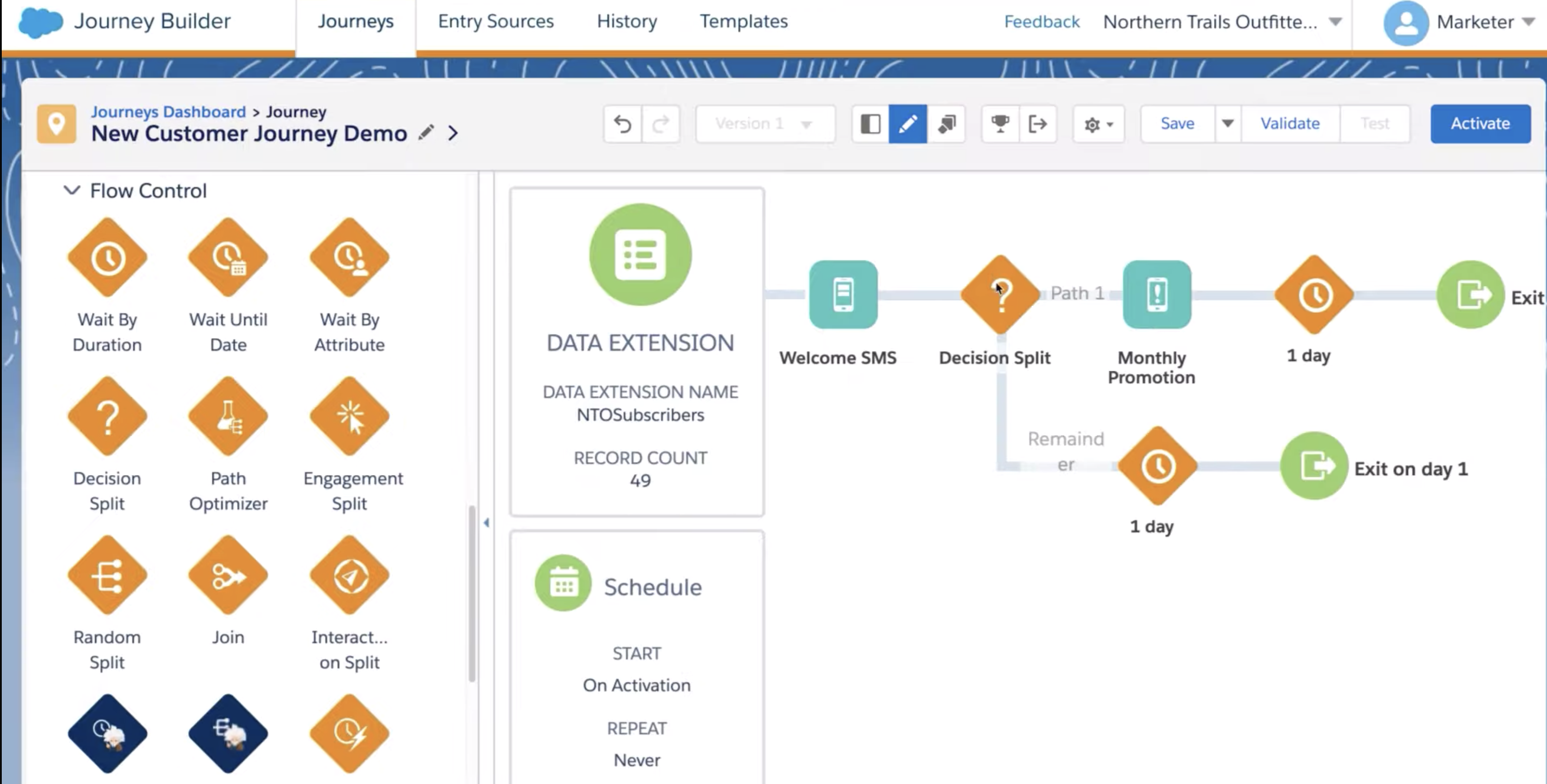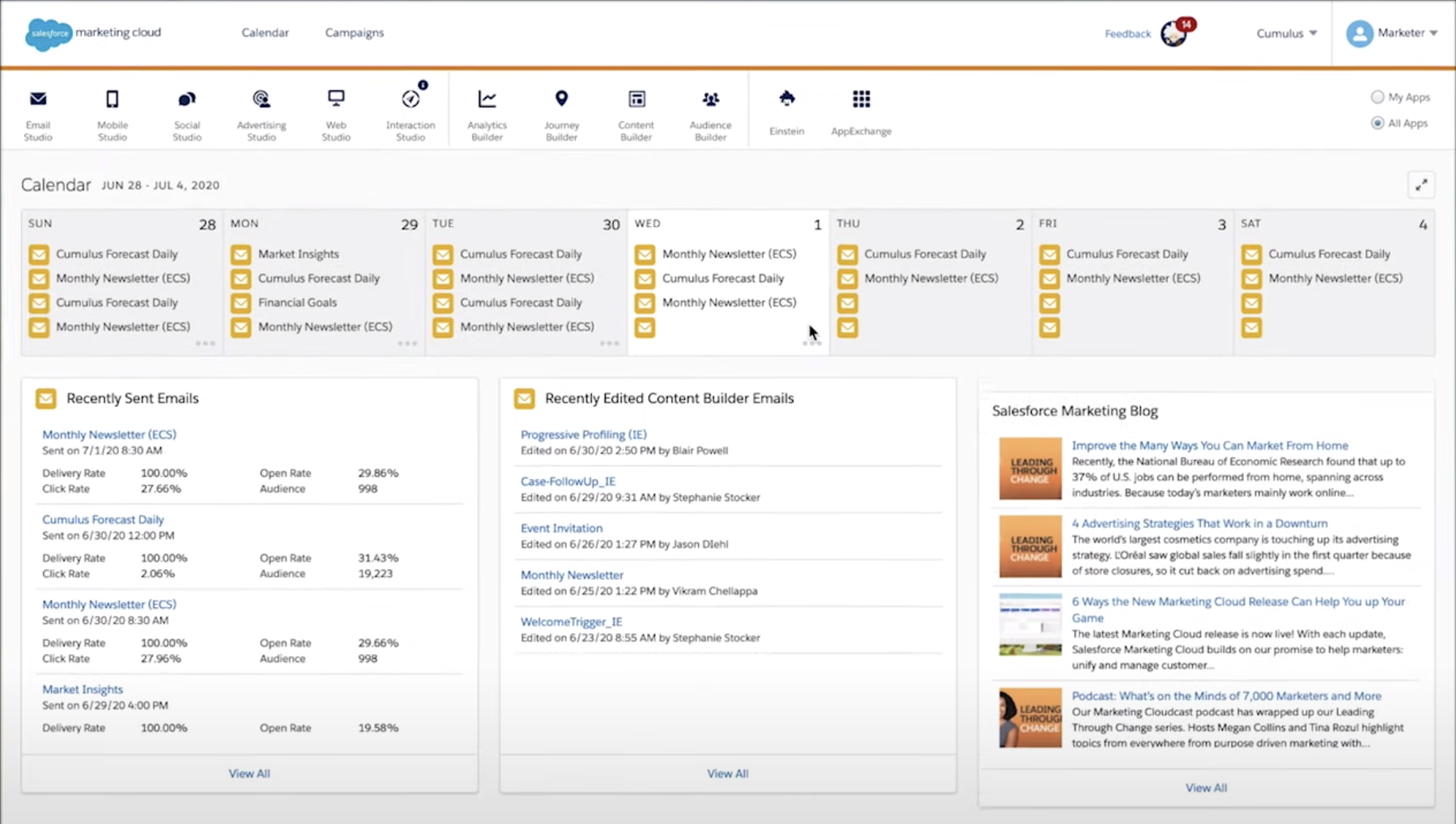Salesforce Marketing Cloud is a digital marketing platform that automates marketing across email, social media, mobile apps, SMS, websites, and more.
Organizations invest in Salesforce Marketing Cloud (SFMC) to combine all marketing channels in one place. Ultimately, marketers are able to send personalized messages, through the right channel, at the right time.
Salesforce Marketing Cloud (formerly ExactTarget) is a Salesforce product that is not built on the core Salesforce platform; instead, connectors are used to sync data between your core Salesforce org and your SFMC account. Once you tap into SFMC, you will realize how powerful this feature-rich product can be.
Salesforce Marketing Cloud Products


What is Salesforce Marketing Cloud Used For?
Salesforce Marketing Cloud is a marketing automation platform that is used for:
- Email marketing.
- Content creation and management (emails, landing page templates, forms, images, coupons).
- SMS sending and monitoring.
- Mobile push notifications, including in-app notifications.
- Visually map out campaign automation, bringing multiple channels into one view.
- Targeted online advertising: find lookalike audiences that behave like your current high-value customers.
- Website ‘listening’ to dynamically tailor webpages to prospect interests.
- Powerful segmentation, with access to potentially many attributes from your CRM and other sources.
- Data management/ETL activities, eg. import file, file transfer, data extract, SQL query, filter, and script. Then use these to create multi-step automated workflows.


What Does Marketing Cloud Include?
Salesforce Marketing Cloud consists of two types of modules:
- Studios: manage content and specific marketing channels, eg. Email Studio.
- Builders: manage data and campaign automation, eg. Journey Builder.
As Salesforce has acquired more technologies, the full SFMC suite includes analytics, CDP, Google plug-ins, and more.


You can find out about Marketing Cloud pricing in our guide.
Now, let’s look at what each Marketing Cloud Studio and Builder does:
Marketing Cloud ‘Studios’
- Email Studio: build emails (Content Builder), preview, test, and send.
- Mobile Studio: create, send, and monitor SMS (MobileConnect, GroupConnect). Send push notifications (plus silent notifications, in-app messaging, Bluetooth Beacons, and Geo-location (MobilePush).
- Social Studio [Scheduled retirement, Nov 2024] : create, schedule, and monitor social media posts and take advantage of real-time engagement, and rich analytics – all in a unified interface.
- Advertising (formerly Advertising Studio): align online advertising with your CRM data. Find new prospects with lookalike audiences that behave like your current high-value customers (also tap into Facebook lookalike audiences, and Google similar audiences).
- Web Studio: manage web experiences (ie. landing pages, microsites). CloudPages organizes all web content (including forms, coupons). Collect data to further personalize web experiences.
- Automation Studio: create marketing automation and data management activities, then add them to the Journey Builder canvas to make multi-step automated workflows. Example activities include import file, file transfer, data extract, SQL query, filter, and script.
Marketing Cloud ‘Builders’
- Journey Builder (AKA. Marketing Cloud Engagement): an amazing campaign automation building experience that visually maps out the ‘journey’ contacts will make through your marketing touchpoints. Segment contacts into further targetted audiences using paths, and leverage a sidebar of different entry sources, activities (eg. send SMS) and flow controls.
- Contact Builder: manage data about contacts (the ‘people’ records in Marketing Cloud). It gives access to demographic and behavioral information, organized into ‘attribute groups’ (eg. abandoned carts), ‘events’, and ‘populations’ that can then be segmented.
- Content Builder: build emails and landing page templates – including reusable/interactive content blocks.
- BrandBuilder: customize the look and feel of your Marketing Cloud account by uploading your company logo and changing the default color scheme to your own. In Enterprise 2.0, you can create multiple brands and assign them to business units.
- Analytics Builder → Standard Reports: built-in Marketing Cloud reporting on email campaigns, web and mobile analytics, contact behavior, administrator monitoring, and more. Use these insights to set marketing goals and refine customer journeys. Note: Discover Reporting Tool support/updates are scheduled to end in April 2022.
- Analytics Builder → Datorama Reports for Marketing Cloud: launched in the January 2021 Marketing Cloud release, these Datorama reports will replace the Discover Reporting Tool. Until now, campaign and journey reporting has been a pain point, now it’s much easier using Datorama reports’ pre-built dashboards. It’s available as an app in Marketing Cloud with a Datorama account created in the background. (Read more background and Get Started with Datorama Reports).
Builders can use the items you create in the studios (eg. Journey Builder uses the activities you build in Automation Studio), OR studios can use the items you create in the builders (eg. Email Studio uses content blocks created in Content Builder). It’s this functionality crisscrossing between builders and studios that make the Marketing Cloud product suite flexible, but tough to grasp.
- Marketing Cloud Connect: The Salesforce to Marketing Cloud connector that allows data to sync from the core Salesforce platform to SFMC, and vice versa.
New Marketing Cloud Technologies
- Marketing Cloud Einstein: Einstein is Salesforce’s collection of AI-enabled features. The following features act as a wrapper around other Marketing Cloud features: Send Time Optimization (Email Studio), Einstein Scoring Splits (Journey Builder), Einstein Engagement Scoring, Einstein Email/Web Recommendations, Einstein Content Selection/Content Tagging (Content Builder) – and more…
- Audience Studio (formerly Salesforce DMP): “capture data from any source and device”, “discover new audiences…analyze billions of profiles and trillions of events to find new high-value segments”, 1-to-1 ad targeting on any device.
- Data Studio: gives you access to data lakes that leverage anonymized data for advertising. Note: Data Studio is only available with Audience Studio.
- Marketing Cloud Personalization (formerly Interaction Studio): provides a whole new level of personalization for your web experiences. By listening to the actions your customers are performing on your website, Interaction Studio modifies messaging to tailor the experience to the kind of products and services they are interested in. This product was formerly known as Evergage, pre-acquisition. Now, both Data Science Workbench and Data Warehouse are all part of Interaction Studio (Evergage + Data Science Workbench + Data Warehouse = Interaction Studio).
- Google Analytics 360: connects Google Analytics Sales Cloud and Marketing Cloud. Google Analytics opens up richer engagement and audience data; when combined with Salesforce automation capabilities, Salesforce customers can get more granular with customer journey analysis.
- Distributed Marketing: marketing across advisors, franchisees, and partners. By giving controlled access to your marketing assets, maintain branding, compliance, and track partner audience engagement.
- Marketing Cloud Intelligence (formerly Datorama): a marketing analytics platform to unify data from all of your marketing tools (performs ETL for multiple data sources) so you have one source of truth. The Datorama Marketplace enables developers to create custom apps that leverage the platform’s layer of marketing intelligence technology.
- Marketing Cloud Customer Data Platform (formerly Salesforce CDP, formerly Customer 360 Audiences): aggregates every data point about an individual customer across multiple platforms, represented by a unique identifier.
- Loyalty Management: build loyalty programs at scale, using clicks not code. You can create a variety of programs including tiered memberships, or points per purchase (note: this is built on the core Salesforce platform, and so also works with other platform products, such as Experience Cloud).
- Marketing Cloud Growth Edition: The new edition targeted at B2B, SMB (small-medium) organizations.
- Marketing Cloud for Nonprofits: This discounted Marketing Cloud license type also includes predefined email templates and journeys for nonprofit use cases, with much more to come with this package in the future!
Salesforce Sales Cloud vs. Marketing Cloud
Marketing Cloud is designed for marketers, whereas Sales Cloud is for sales teams (which is the obvious difference).
Sales Cloud manages the lead-to-revenue cycle (and more) and includes objects such as leads, opportunities, orders etc. Marketing Cloud manages marketing touchpoints across the whole customer lifecycle, and so taps into other datasets beyond Sales Cloud (eg. website analytics, service case data, advertising data).
Salesforce is the core CRM (customer database) platform, which Sales Cloud is built on. Salesforce Marketing Cloud is not built on the core Salesforce platform; instead, connectors are used to sync data bidirectionally between the two. There are a number of reasons why, but simply put, Salesforce Marketing Cloud was a product Salesforce acquired (ExactTarget) whereas Sales Cloud was the original Salesforce product.
Account Engagement (Pardot) vs. Marketing Cloud
Account Engagement (formerly known as Pardot) is used for ‘considered purchases’ where there are long sales cycles, and multiple decision-makers. Marketing Cloud is best suited to transactional purchases across multiple marketing channels.
This means you will often hear Account Engagement is for B2B Marketing (Business-to-business) and Marketing Cloud is for B2C Marketing (Business-to-consumer) – which is a simple distinction, but not always true.
Marketing Cloud pricing is higher than the cost of Account Engagement.
Rebranding in April 2022 lead Pardot to become “Marketing Cloud Account Engagement”. While it shares the same name, the two products remain distinct, both in terms of licensing and technical architecture.
Should You Use Marketing Cloud?
Your organization should use Marketing Cloud if you:
- Have transactional purchases/no long sales cycles,
- Need to compile large amounts of behavioral data from multiple sources,
- Want to segment contacts using multiple datasets that aren’t stored in your core Salesforce org,
- Have a reasonably tech-savvy marketing team (or you are willing to invest in training)
- Have the budget to spend!
Thanks to Alexandre Ruiz & Oana Munteanu, who are the real heroes here, helping to demystify the SFMC Studios and Builders – the new acquisitions, the re-branded products, and the evolving ones, too!